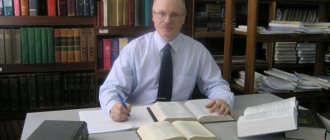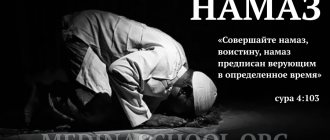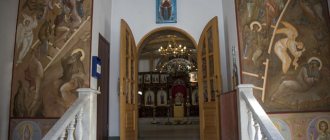Riddle of dreams
"The Dream of Saint Joseph", Anton Raphael Mengs
Briefly about scientific attempts to explain sleep and dreams
Here, first of all, it must be said that this phenomenon is mysterious, and is not fully understood by science. For example, in dreams there is one such amazing detail, known to almost every person. It happens that we see such a dream as if, for example, we were wandering somewhere for a long time in unknown places and suddenly unexpectedly fall into a hole or abyss... We wake up - it turns out that we accidentally fell out of bed...
It would seem that there is nothing strange about this; many have experienced this or something similar. But here’s the question: after all, the fall happened at the end of the dream, but how did the sequence of events in it turn out to be adjusted to its end?!
Priest Pavel Florensky, discussing this amazing property of dreams, cites a real scientific experiment as an example. When a sleeping man was deliberately given a light blow to the neck, and he, upon waking up, told a whole story, which, according to him, lasted a couple of hours.
He dreamed that during the French Revolution, being some kind of aristocrat, he was hiding from the persecution of the Jacobins or some other revolutionaries. He hides and disguises himself for a long time, but in the end, he was caught, tried and guillotined - which, in fact, meant that light blow to the neck from which he woke up. But then the question is: how did all these events, all the logic of this dream adapt to that external influence (this blow to the neck) that occurred at the end of it?!
As an attempt to explain this phenomenon, there is a scientific opinion that suggests that in dreams, at least sometimes, time moves backwards in relation to reality. Therefore, cause and effect change places there. Therefore, what in reality caused the dream (a blow to the neck, falling out of bed, etc.) in the dream itself turns out to be only a consequence of logically interrelated dream events.
But this is just a scientific hypothesis, which could not be confirmed or refuted, just as it was not possible to fully explain what sleep and dreams are using scientific methods alone? This is not surprising, since the existence of dreams goes beyond the limits of scientific research methods, which can only study material objects. Where by substance is meant what is given to us in our sensations, i.e. what we can know with our five senses: sight; hearing; sense of smell; taste and touch.
It is precisely these bodily human feelings, albeit extended and deepened by appropriate devices, that scientific knowledge is carried out. Nevertheless, what lies beyond the capabilities of these senses and corresponding instruments, all this is obviously beyond the limits of scientific knowledge. In particular, this applies to the phenomena of the spiritual world, which we cannot cognize either with our bodily senses or with any instruments.
This conclusion is fully valid in relation to sleep and dreams, which are objects not only of the material, but also of the spiritual world. Therefore, a more precise definition of these items can be given by:
Christian concept of sleep and dreams
I think that from a Christian point of view they can be defined as the natural spiritual life of a person. Christianity itself offers man such a life in a supernatural way, by the grace of God, which opens to the Christian the depths of the spirit and the gates of the Kingdom of Heaven.
But at the same time, every person is given the opportunity to participate in spiritual life in a natural way - through sleep and dreams. And indeed, even just a superficial glance at the latter speaks precisely of this. After all, during sleep, the body sleeps, and we do not consciously carry out any bodily activity during sleep. What then are the actions that we dream we perform in our dreams? Obviously, this is not physical, but that same natural spiritual life. And this Christian definition of sleep gives an idea of what can be called:
February 18 - what is the Orthodox holiday today?
On this day, the Orthodox Church honors the martyr Agafia, who died in 251 under Emperor Decius. Saint Agathia was born in Sicily, the daughter of eminent and wealthy Christians. During the persecution of Emperor Decius, the city governor of the city of Catana heard about the wealth and beauty of 15-year-old Agathia and ordered her to be brought to trial.
In Catan, a Christian woman was placed with a rich woman who was raising five daughters. The girls showed off their outfits, vying with each other to order delicious treats, and organized parties and exquisite entertainment. They sought to show Agathia how to live sweetly in pleasure, to indulge all their desires. Feeling sorry for their peer, they convinced her to make a sacrifice to the pagan gods. Agathia did not succumb to temptation; during interrogation she refused to betray her faith.
Then the girl was subjected to severe torture. But in prison the holy Apostle Peter appeared to the sufferer and healed her of her wounds. When she was brought back to trial, Agathia was unharmed. It was decided to continue the torture. Suddenly an earthquake began in the city. Frightened residents ran to the mayor, demanding that he stop the torture. Fearing popular outrage, he sent the saint back to prison. There the martyr Agathia peacefully surrendered her spirit to God.
Moral ambiguity of dreams
For the ability for natural spiritual life inherent in human nature by God is, on the one hand, of course, good. Because it allows absolutely all people to lead such a life, including pagans, those of little faith, or even the most sworn atheists. So, for example, both Pharaoh (Gen.41: 1-7) and Nebuchadnezzar (Dan.2: 1;27-48) saw prophetic dreams, although they were pagans. From here it can be noted that even they, by the grace of God, turned out to be not alien to spiritual life, albeit in a natural way. And this, as already said, is good!
But, on the other hand, when we talk about something natural for a person, we must keep in mind that this very nature, his very nature, was damaged by the fall of his ancestors. Therefore, as the holy fathers say, in particular, the outstanding ascetic, ascetic and teacher of spiritual life, Saint Ignatius (Brianchaninov), wrote a lot about this: when the spiritual world is revealed to a person, then he, as a fallen being, first of all sees the world of fallen spirits, i.e. e. demons. And many ascetic conclusions follow from here.
Folk signs for the weather on February 18, 2022
According to signs on Agafya's day, they predicted the weather for spring and summer. The old people used to say: “If there is frost on this day, then the spring will be “friendly”, and the summer will be dry and hot.”
- The day turned out to be clear, without snow - expect drought in the summer.
- It's warm and spring will soon come.
- Frost on the trees - in summer there will be a lot of dew and honey.
- Bright stars in the sky mean frost.
- Severe frosts have struck - winter is about to end.
- Long icicles have grown on the roofs - a long spring is expected.
- Thunder rumbles - a strong wind.
- The colder the day, the warmer March will be.
- If the weather is warm, then there will be no severe frosts.
- Frost on this day means a hot and dry summer.
Why do people dream?
The Holy Fathers teach that dreams happen for three reasons: due to the action of the flesh; by the action of demons; and, finally, they come from God. First, i.e. the action of the flesh is the only one that science sees. And he explains this quite correctly: during the day or over a longer period of time, a person is engaged in certain activities, gains various impressions, experiences various emotions - all this then affects him at night, during sleep, causing him to have certain dreams.
Or another example: someone is sick with some kind of disease that causes him to have asthma attacks, and while awake, he may not even feel them. But during sleep he will dream that someone is strangling him, that he is suffocating and drowning in water, etc.
This is approximately how science tries to explain dreams and dreams, and this explanation, in general, is correct, but one-sided and therefore completely insufficient. Since it applies only to dreams that occur through the action of the flesh. But it does not consider those dreams that occur under the influence of evil spirits or, moreover, does not say anything about dreams that come from God, for example, prophetic ones.
But there is more than enough evidence about the latter, both in the Holy Scriptures and Holy Tradition, and in the lives of many people. Koi experienced premonitions or warnings in their dreams about dangerous events awaiting them, which then actually happened.
Therefore, what is needed here is not a one-sided scientific, but a comprehensive Orthodox study of what dreams and dreams are; what benefits or dangers they contain, as well as:
Should you believe dreams, Orthodox point of view
The Orthodox Church teaches that it is not worth it. And here’s why: firstly, the overwhelming majority of our dreams (the Holy Fathers say 95 percent) due to our sinful, unclean life happen for the first two reasons mentioned above: the action of the flesh or the tricks of demons. In both cases, they cannot be trusted.
Dreams based on the action of the flesh are often meaningless, absurd and contradictory. Therefore, the results of attempts to find meaning in them, i.e. interpret them will also be just as meaningless, absurd and contradictory.
Secondly, it is even worse to believe the dreams that demons instill in us. As St. John Climacus speaks of the latter, they, i.e. demons want only one thing - our destruction. They are trying to achieve this by instilling in us certain dreams (in particular, prodigal ones; which will be discussed below), and then, with the same goal of our destruction, they persuade us to believe in these dreams and interpret them.
So, let's say, for example, a person is as healthy as an ox, but demons begin to instill in him dreams that he is seriously ill and will soon die. If he believes these dreams, he will fall into such grave sinful passions as despondency and despair. And then, because of this suspiciousness inspired by demonic dreams, he can actually become seriously ill and even die without repentance. This is the main goal of demons who instill such dreams and offer to interpret them in the evil spirit that suits them.
However, they may ask: but there are, as you yourself said, dreams from God - how should we relate to them?
Numbers and dreams in the Bible: meaning
One of the most intriguing parts of dreams are the numbers.
The psalmist wrote that God's ways are perfect in design. God's word and His works are in perfect order and harmony with each other. They are also perfect in power, holiness and righteousness. And therefore they are perfect in numbers. Everything God does is perfect. His works are perfect in the time and period in which they occur. God's words were perfect when the prophets spoke them and they were perfect when they were written.
Abraham and the stars
God even numbers the stars, calling them by name. God also counts the heavenly army and also calls them by name. God measures the weight of the water on the face of the earth.
Numbers have always played a big role in how God speaks to us. God is perfect and everything he does is of a perfect nature. So it is no coincidence that God uses the words:
- number;
- read;
- measure.
Numbers are very significant to God. It turns out that all of creation can be understood using mathematical equations, that is, using a set of numbers.
The number 12 appears frequently in the Bible.
- Twelve Tribes of Israel.
- Twelve judges of Israel.
- Also twelve Apostles.
- Twelve months in the Hebrew and Roman calendars.
And there is a long list associated with this number that we see in the Word of God. History shows us that numbers can be confusing, and this confusion is exacerbated by those who try to fit the numbers to their own agendas and agendas.
However, there are many connections to numbers in Scripture. It is what the Bible says about numbers that is very important to us.
How to understand that a dream is from God
And the concept of this appears precisely when a person does not believe his dreams, even if they really are from God. The same law applies here as with some spiritual visions in reality. In both cases (in these waking visions) and in the other case (in dreams), the one who sees them is immediately obliged to doubt that they are from God.
If he shows such doubt, then the Lord, in any case, will not punish him for it. For such doubt or unbelief is a sign of a person’s humility: in his humility he believes that he is unworthy of such visions or dreams from God. What is virtue, why does the Savior not punish a person in this case? True, He Himself or through His saints (angels, saints, martyrs, saints), who appeared in a dream or in reality to a Christian, can fatherly scold the latter and even threaten him with something; There are many such cases in the lives of saints. But these threats were never carried out in practice if the Christian himself, after such admonition, put aside doubt or unbelief and did what he was told in a vision or dream.
And this is precisely a sign that this vision or dream was from God. When a Christian, in his humility, shows reasonable unbelief or doubt about the truth of it, then, if this vision or dream was from God, it will repeat itself. Sometimes it will be repeated so many times until the person of little faith believes in it. There are also more than enough cases of this in the lives of saints.
And, on the contrary, if a Christian does not show this reasonable doubt, but immediately out of pride (thinking that he, as a saint or close to this, is already worthy of such divine phenomena) believes this vision or dream, then if it was from demons, he can easily fall under their power, falling into delusion! And there are also plenty of such cases in the lives of saints!
This, of course, is the extreme danger of supposedly “prophetic” and prophetic dreams and unreasonable faith in them. In this case, it is easy to fall into delusion, but it is extremely difficult to get rid of it, especially in our spiritually difficult times! However, this is not the only danger that comes from dreams. In the latter, as mentioned above, a person, realizing his natural spiritual life, as a fallen being, first of all encounters the world of fallen spirits. Which seek to destroy him, first of all, bringing to him:
How to go to bed as an Orthodox Christian
Dreams are divided into two types: the first occurs after the body is burdened with gluttony, which gives rise to the sin of fornication; the second comes when a person loses all strength and is no longer able to serve the Lord while awake.
The Holy Fathers advise before going to bed to remember good deeds and thank the Lord
I. Cassian also mentions two types of harm that a monk or a simple layman suffers from dreamy dreams.
- The devil enters the monk's mind, trying to desecrate the purity hated by all demons. Dark energies bring despair for a while at those moments when various fantasy ideas arise in the mind.
- However, pure sleep without any visions can relax a true believer. It brings lethargy, dulls spiritual vigilance and dries up the heart; the monk loses caution and becomes more susceptible to the slander of the enemy.
Some weaknesses come to the bed when a person has already woken up and urge him to go to bed again - this teaches him to skip morning prayer. Other sins plunge the mind into daydreaming during worship services.
Sleeping a lot has its negative sides: it makes the soul cruel, while moderate wakefulness cleanses the mind of careless thoughts. A sleepy monk or layman is addicted to the sin of fornication. When an Orthodox believer keeps vigil, it allows him to extinguish the burning sensation of the flesh and get rid of daydreams. Excessive dreams give rise to dark oblivion; they, like evil thieves, steal half of a lazy person’s life.
Prodigal dreams
What it is
In practice, everyone, or almost all people, encounter this. When in a dream a person sees lewd images or actions, because of which he becomes inflamed by the flesh. Moreover, often such a dream can end with expiration in men, and in women – in orgasm. Most often this happens to young men, but girls and women do not avoid it.
As was said, practically everyone faces this, but not many people know what it essentially is. In fact, such visions and images in a dream are caused by a prodigal demon. And it must be said that the demonic suggestion of fornication is one of the main demonic ways of seducing and destroying people. After all, the spirits of only one of the twenty ordeals - the ordeal of fornication - boast that they alone destroy people more than all the demons of the other nineteen.
Only in the case of prodigal dreams do prodigal demons do this, we must give them their due, in a rather original and peculiar way. Something that needs special mention. Therefore, we will also begin in an original and unique way with:
Why are prodigal dreams not dangerous?
Strange as it may sound, but in themselves, in relation to, in fact, the sin of fornication, they are practically harmless. After all, a fornication dream is not a porn film that the fornicator turns on consciously and of his own free will, and is therefore guilty of this fornication sin. Dreams are beyond our will; as a rule, we cannot control them by ordering this or that dream, and we also cannot stop them.
Therefore, a prodigal dream, in itself, is not a sin. This is what the holy fathers teach, in particular, St. John Climacus calls such a prodigal dream “a sinless sin.” In general, this is the teaching of the Orthodox Church, which in this case suggests that the person who has been defiled in a dream, first of all, wash himself, change his defiled clothes and read the “Rule against defilement” (“Sometimes someone will be tempted in a dream by the work of the devil”).
So, by the way, quite often, especially among boys and girls, a situation occurs when he or she, having prepared for communion, becomes defiled in a dream the night before it. In this case, the Church has established for the Orthodox to do everything that was mentioned in the previous paragraph. Moreover, if you lack time, you can read the abbreviated “Prayer against desecration”; it is placed under the full "Rule". And, having done all this, you can boldly, without embarrassment, go to church to receive communion; but, of course, in confession, telling the priest about the misfortune that happened at night.
By this the Orthodox Church shows its contempt for the demonic machinations. And indeed, the demon, and not the sleeping Christian, is to blame for the nighttime misfortune. In a dream, he seems to find himself in a situation similar to the one when he has to travel in public transport, where a drunken group swears at the top of his lungs, swears, tells vulgar jokes, and a decent person involuntarily has to listen to all this. But he can at least do something, for example, by reprimanding drunkards. However, the sleeper cannot even do this. Therefore, it is not he who is to blame for the prodigal dream, but the demon that brings it to him.
When prodigal dreams are dangerous
This happens for two reasons. Firstly, when, having seen enough of all sorts of scenes of fornication in a dream, a person begins to remember them in reality, and, even more so, to enjoy them, to be kindled by these memories, to desire them and act on them, for example, already in reality indulging in the sin of fornication.
That is why the holy fathers advise that when we wake up in the morning, we should not lie in bed for a long time, remembering dreams, especially carnal ones. But, while still lying down, we immediately read the Jesus Prayer at least once (it must be read even after waking up at night), and better, if possible, several times; You can also drink holy water. All this allows you to forget the sleepy fornication inspired by demons, destroying unclean memories with prayer and holy water.
Or, as David says: “In the morning we slaughtered all the sinners of the earth, who consumed all the workers of iniquity from the city of the Lord” (Ps. 100: 8). David was the king of Israel, and some may think that here he is talking about beating state criminals. But the holy interpreters of the Holy Scripture point out that he could not execute them “in the morning,” i.e. every morning. Suppose he beat them all up one morning, where did the new ones come from the next morning?! No, here we are talking about the fact that every morning he beat out sinful thoughts inspired by dreams with prayer and other ascetic means, and in this psalm he teaches us to do the same.
Secondly, fornication dreams are dangerous, especially for neophytes, when, due to inexperience, contrary to the above-mentioned teaching of the Church, which treats these dreams with contempt, they mistake them for real fornication. Unable to get rid of such dreams, they sometimes fall into despair because of this. And in this state they begin to fornicate for real, in reality. And it must be said that here the sin of despair is more dangerous than fornication itself. And what saves a Christian from such a misfortune is knowledge and firm adherence to the above-mentioned contemptuous attitude of the Church towards the demonic sleepy machinations!
How to relate to dream books and dream interpretations
In section three of this article, entitled “Should you believe dreams,” it was already explained in detail that you should not believe them. Since the overwhelming majority of them (95 percent) are due to the action of the flesh or the devil. The first ones (according to the flesh), as a rule, are meaningless, and therefore there is no point in interpreting them. The second (from the devil) are obviously false and serve to the destruction of a person. Therefore, their interpretation is not only false, but also psychologically harmful.
From here it becomes clear how to relate to these dream books and dream interpreters - this is, to put it mildly, very dubious literature. And it’s best for an Orthodox Christian not to mess with her!
But they may object to me by citing certain examples of how “dreams came true in reality exactly as predicted by this or that dream book.” In this case, as in all such secular fortune-telling and prophecies that claim to be “prophecies”, in fact there is nothing supernatural. But these false prophets, fortune-tellers and swindlers mainly use two completely natural laws: knowledge of psychology and the theory of probability.
To understand how this works, consider this example from a dream book taken offhand. I quote him:
“Why do you dream of a coffin? A coffin in a dream is a symbol of the completion of affairs, the beginning of a new stage of life. You will be open to change and set new goals for yourself. Don't be afraid of change. Fill the events in your life with positive meaning.”
Obviously, this can happen to anyone. But, most likely, the dream book’s prophecy will not come true; and also, most likely, the person will forget this dream and this prophecy. This is the law of psychology - we usually forget everything ordinary, in particular, what did not come true.
But, on the other hand, there is a small probability that after such a dream someone’s life will actually change and a new period will begin. This is precisely what will be passed off as prophecy, although in fact it is simply the theory of probability and the law of large numbers.
And if we divide one allegedly fulfilled “prophecy” into many unfulfilled and forgotten ones, we will see that it does not go beyond a small percentage of quite probable average coincidences. However, according to the laws of the psychology of fallen human nature, this coincidence will be passed off by cheaters as a real prophecy or even a prophecy.
Well, and, of course, such tricks of these swindlers are not complete without getting into the pockets of gullible suckers. This is where all the interest of all these fortunetellers and interpreters comes from. Starting from the sale of a mass of such literature (dream books, fortune telling, interpretation of dreams, etc.) - this is petty cheating; and ending with receptions from famous fortune-tellers and interpreters, who now take much larger sums for their deception.
Meanwhile, from the Holy Scriptures and Holy Tradition we know about real prophetic dreams from God. Dreams that were interpreted by holy men moved by the Holy Spirit.
Examples from Scripture
This is how the biblical Book of Genesis talks about the prophetic dreams of Pharaoh. When he first dreamed of seven fat cows, which were devoured by seven skinny ones; then I had a similar dream, when seven fat and good ears of corn devoured seven lean and withered ones (Gen. 41: 1-7).
This dream was interpreted to Pharaoh by the righteous Joseph, enlightened by the Holy Spirit (Gen. 41: 16-36). Interpreted in the sense that Egypt and the surrounding lands expect seven years of extraordinary fertility and abundance, which, among other things, will be followed by seven years of crop failure and terrible famine. Which exactly came true later. Moreover, the godly Joseph also gave the Egyptian king advice on how to avoid this disaster.
In exactly the same way, the king of Babylon, Nebuchadnezzar, saw a prophetic dream relating to the distant future, and his dream was interpreted for him, as did the righteous Joseph, moved by the Spirit of God, and the prophet Daniel (Dan. 2: 1; 27-48).
Other pagan kings also saw similar prophetic dreams. The question arises: why did these pagans see such prophetic dreams from God? The Holy Fathers answer this question this way: these prophecies were given to them in a dream because they were rulers and shepherds of nations, for whose benefit they were granted such prophetic dreams, for example, warning them and their peoples from dangers.
So, for example, the prophetic dream of Pharaoh and, most importantly, the interpretation of this dream by Joseph, made it possible to save the peoples of Egypt and the lands surrounding this country from hunger. In particular, this is how the relatives of Joseph himself were saved, in particular, his father Jacob and his brothers with their families, who constitute the future seed or beginning of God’s chosen Israel!
But, of course, dreams from God were given to righteous people to an even greater extent. Moreover, in these dreams they received direct commands from the Lord, serving for their benefit and the fulfillment of God’s Providence. Thus, the Angel of the Lord repeatedly appeared in a dream to the righteous Joseph, the betrothed of the Virgin Mary (Matt. 1: 20-22; 2.13). In the first case, the Angel testified to the Ever-Virginity of the Mother of God; and in the second, he warned Joseph about the persecution of the lawless Herod and commanded him, taking the Mother of God and the Child of God, to flee from this persecution to Egypt. The elder fulfilled some of his commands. Thanks to this, the machinations of the evil Jewish king Herod came to nothing.
Examples from Sacred Tradition
Also, many dreams from God are described in the Holy Tradition, in particular, in the lives of saints. So, for example, there are many cases when certain saints appeared to the sick in a dream and healed them of their illnesses. In a similar way, the holy unmercenaries and wonderworkers Cosmas and Damian (November 1/14) healed a man who had swallowed a snake in a dream.
In dreams, saints and other people were given revelations from God. For example, a disciple of St. Basil the New (March 26/April 8), a certain Gregory, was honored in a dream vision to talk with the already deceased St. Theodora, who told him about how the soul is separated from the body at death; how and what afterlife ordeals she goes through; showed him the bliss of the righteous in paradise and the torment of sinners in hell.
In the Lives there are also stories about how dreams happened at the instigation of the devil with the aim of seducing a person. And how the saints fought such dreams. In this regard, the life of the Venerable Eupraxia, Virgin of Taven (July 25/August 7) is especially interesting. In which, in particular, it is told how this beautiful maiden, from the royal family, who loved Christ most of all and for His sake preserved her purity, courageously fought against sleepy demonic excuses. With which Satan tried to confuse the saint and persuade her to worldly life, but was unsuccessful in anything!
Do's and Don'ts February 18, 2022
What can you do
On Agafya, you should definitely go to the cemetery to visit deceased family members, if possible. It is not necessary to carry out general cleaning at the grave - it is important to show that you have not forgotten about the departed. It would be nice to have a small wake at home.
Since the saint is considered the patroness of livestock and cows as the main nurses, in Rus' on this day they asked Agafya the Cowgirl to look after the animals and protect them from death and disease. And the housewives carried out a special ritual in the barn so that at the next calving the cow would bring not a bull, but a heifer - another wet nurse.










